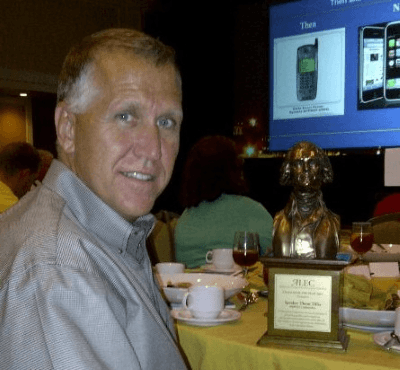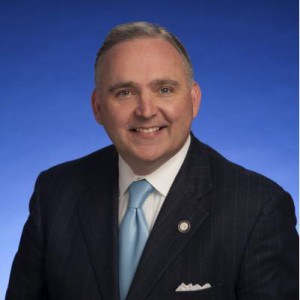 AT&T has gone over the top donating at least $70,000 to back Republican House Speaker Paul Ryan, more than the company has ever donated to anyone else.
AT&T has gone over the top donating at least $70,000 to back Republican House Speaker Paul Ryan, more than the company has ever donated to anyone else.
It isn’t by coincidence.
According to Communications Daily (subscription req’d), one of Ryan’s top priorities for 2017 is a possible complete rewrite of the Telecommunications Act — the nation’s most important federal law governing telecommunications regulation and the operations of the Federal Communications Commission. Ryan and many of his fellow Republicans have been critical of the FCC’s growing interest in consumer protection and industry oversight.
Ryan’s efforts to push for further deregulation and policies that could lead to further industry consolidation could generate a windfall in the billions for AT&T. Past revisions of the Act have radically transformed the telecom landscape in the United States. President Bill Clinton’s signature on the 1996 Telecommunications Act opened the door to a tsunami of cross-media ownership and radio/TV station consolidation. Provisions in the ’96 Act were promoted as bolstering competition, but critics argued consolidation was favored over competition.
Howard Zinn summarized the effects of the ’96 law in his book A People’s History of the United States: “[it] enabled the handful of corporations dominating the airwaves to expand their power further. Mergers enabled tighter control of information.” Adding to the criticism, Latin American writer Eduardo Galeano echoed: “Never have so many been held incommunicado by so few.”
In 2000 Consumers Union blasted the ’96 Act as legislative bait and switch.

Ryan
“It is evident that the Telecommunications Act of 1996 has failed to produce the consumer benefits policy makers promised because competition has failed to take hold across the communications industry,” the group said. “The fundamental problem is that the huge companies that dominate the telephone and cable TV industries prefer mergers and acquisitions to competition.”
AT&T is reportedly interested in access to lawmakers to lobby for telecom reforms that will allow it to switch off its legacy copper wire phone network in rural America, force certain consumers to wireless-only landline service, get rid of Net Neutrality, allow more wireless industry consolidation, ban municipal broadband, have a louder voice on privacy and cybersecurity regulation, access to wireless spectrum, and preferably a de-fanged FCC.
Public Citizen government affairs lobbyist Craig Holman told Communications Daily AT&T’s contributions are a “fundamental way of gaining access and influence to policymakers,” as part of Washington’s “pay-to-play system.”
The only entity giving Ryan more money than AT&T was the deregulation-obsessed Koch Industries, which gave $75,000.
Ryan’s current chief of staff is a close friend to Big Telecom. David Hoppe lobbied for AT&T, USTelecom and Verizon before being hired by Ryan. Hoppe’s influence appears to be significant after Ryan introduced “A Better Way,” the GOP’s platform for what they will do if they keep control of Congress and win the White House. The plan makes it clear there is unhappiness with the FCC under the leadership of chairman Thomas Wheeler, opposition to Title II reclassification of broadband — a change that opened the door to enforcing Net Neutrality, and a belief the FCC lacks transparency and is living in the regulatory past.
Holman worries that lobbyist spending in Washington, already a problem, has become insane after Citizens United eliminated limits on campaign contributions.
“The lids have been blown off… it’s breathtaking,” Holman told the newsletter.


 Subscribe
Subscribe

 “Jim is one of the best and brightest around when it comes to politics and public policy. He is respected by everyone, regardless of political party or viewpoint, as a big thinker, a master strategist and someone able to bridge divides to get things done,” Stephenson said, in a statement. “I greatly appreciate his leadership, wise counsel and countless contributions to AT&T over the years. He’s a great friend and we’ll miss him. I want to wish Jim and his wife, Trisha, all my best as they begin a new chapter in their lives.”
“Jim is one of the best and brightest around when it comes to politics and public policy. He is respected by everyone, regardless of political party or viewpoint, as a big thinker, a master strategist and someone able to bridge divides to get things done,” Stephenson said, in a statement. “I greatly appreciate his leadership, wise counsel and countless contributions to AT&T over the years. He’s a great friend and we’ll miss him. I want to wish Jim and his wife, Trisha, all my best as they begin a new chapter in their lives.” Entrenched telecom industry lobbyists and a legislature enriched by their campaign contributions chose the interests of AT&T, Comcast, and Charter Communications over the broadband needs of rural Tennessee, killing a municipal broadband expansion bill already scaled down to little more than a demonstration project.
Entrenched telecom industry lobbyists and a legislature enriched by their campaign contributions chose the interests of AT&T, Comcast, and Charter Communications over the broadband needs of rural Tennessee, killing a municipal broadband expansion bill already scaled down to little more than a demonstration project.



